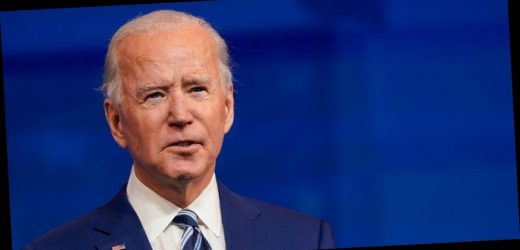- President-elect Joe Biden will take office on January 20, 2021.
- His most pressing challenge come inauguration day will be tackling the COVID-19 pandemic.
- Lawrence O. Gostin, director of the WHO Collaborating Center on Public Health Law & Human Rights, compiled a possible action plan for Biden once he takes office.
- Here is a seven-step plan that could help the President-elect handle the pandemic, which includes tackling healthcare inequities, increasing testing, and unifying a divided country's COVID-19 policies.
- Visit Insider's homepage for more stories.
COVID-19 cases are climbing at an alarming rate in the US after holiday gatherings.
Once he takes office, President-elect Joe Biden will likely be faced with a new wave of cases. He'll also take over a national COVID-19 plan that experts say the Trump administration botched.
Biden's most pressing challenge will be unifying states in their approaches to fighting COVID-19 and vaccinating the public.
Lawrence O. Gostin, a professor of law at Georgetown and director of the WHO Collaborating Center on Public Health Law & Human Rights, made suggestions for additions to Biden's seven-step plan once he takes office.
Here are the seven points Gostin recently laid out in JAMA.
Create a national plan through incentives
States across the US have decided how to handle COVID-19 on an individual level, for better or worse.
It is not possible for the federal government to force states into a national plan, but Gostin wrote it could be helpful for Biden to incentivize governors following a set of national COVID-19 guidelines by offering funding in return.
"It is impossible to control SARS-CoV-2 without a national plan," Gostin wrote.
Gostin said Biden should work with governors to develop national guidelines on face coverings, social distancing, and reopening schools and businesses.
Prioritize science
The Trump administration spent several years cutting funding for organizations fighting COVID-19, including the Centers for Disease Control and the National Security Council's global-health-security unit.
Gostin said one of Biden's primary jobs will be reinstating public trust in science, as well as organizations like the CDC.
Congress should agree to fund the CDC consistently and appoint qualified public health leaders not driven by political interest, Gostin wrote.
Increase COVID-19 testing and contact tracing
Biden's existing COVID-19 plan calls for the expansion of free testing and contact tracing to better track the spread of the virus.
Gostin suggests the 100,000 workers deployed to contact trace should become a permanent fixture in the US for future health crises.
Support healthcare workers with more PPE and hazard pay
Personal protective equipment (PPE) like masks, gloves, and surgical gowns have been difficult for many frontline workers and healthcare providers to access during the pandemic. Stories of healthcare workers finding hacks to make PPE last longer and create DIY PPE out of trash bags have become symbolic of the shortages that have plagued the US.
The lack of PPE has prompted protests and calls for better protection of the people fighting at the frontlines of the pandemic.
Biden's plan calls for giving "all frontline workers high-quality and appropriate personal protective equipment." Gostin said in addition to providing more PPE, Biden should fund hazard pay to healthcare workers.
Create a strong COVID-19 vaccine distribution plan
The Pfizer and Moderna vaccines have already started emergency distribution in the US. Gostin said developing a strong vaccine plan that accounts for inequality of resources, particularly in rural areas, will be essential to quick and effective vaccine roll out.
"The vaccine campaign must build a comprehensive vaccine infrastructure, including human resources, data systems, supply chains, and vaccine education from trusted sources," Gostin wrote.
Prioritize racial and class health equity to combat systemic disparities
Experts say the pandemic has highlighted inequality in the US, particularly along class and race lines. COVID-19 has claimed the lives of a disproportionate number of Black, Latinx, and Native Americans in the US.
Systemic racism hinders access to care. According to US Surgeon General Jerome Adams, stress brought on by discrimination leads to a disproportionate number of people of color developing pre-existing conditions that make COVID-19 more deadly.
A lack of access to healthcare, employment, and discrimination also contribute to high COVID-19 rates among Black Americans, according to a recent study.
While Biden's plan calls for sending 150,000 caregivers across the US to protect vulnerable populations, Gostin suggests the President-elect tackles structural inequality at its root by gathering data to see which populations are the most vulnerable.
"President-elect Biden must commit to structural reforms to create equitable conditions for health ranging from universal health care to safe housing, childcare, nutritious foods, and safe workplace conditions," Gostin wrote.
Take a global approach to attacking COVID-19
President Donald Trump announced plans to terminate the US's relationship with the World Health Organization (WHO) in May 2020. Experts recoiled at the decision, as the WHO aids countries in public health crises and promotes health diplomacy across the globe.
The withdrawal is set to take place in July 2021, but Biden has already said he'll rejoin the organization.
Gostin also suggests Biden gives support to the COVID-19 Vaccines Global Access (COVAX) Facility, which would guarantee COVID-19 vaccine access to 92 lower-income countries that would otherwise have no access until 2022.
If you have a story about the coronavirus pandemic you’d like to share, email us at [email protected].
Get the latest coronavirus business & economic impact analysis from Business Insider Intelligence on how COVID-19 is affecting industries.
Source: Read Full Article


